高一英语上学期第三单元知识点总结
高一新教材英语第三单元知识点详解
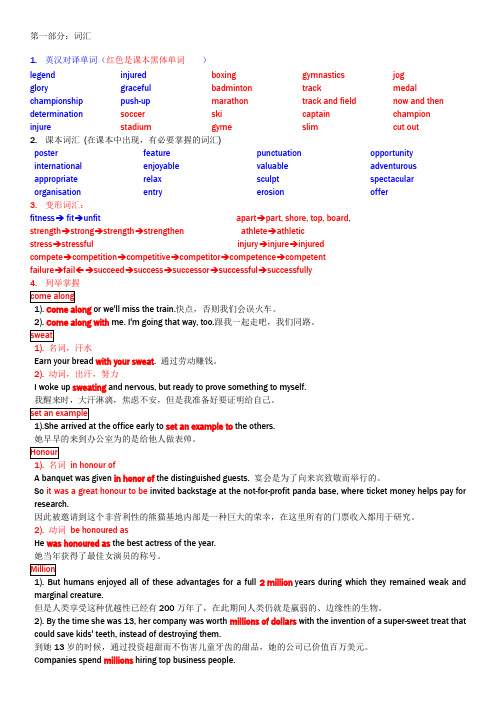
第一部分:词汇1.英汉对译单词(红色是课本黑体单词)legendglory championship determination injure injuredgracefulpush-upsoccerstadiumboxingbadmintonmarathonskigymegymnasticstracktrack and fieldcaptainslimjogmedalnow and thenchampioncut out2.课本词汇(在课本中出现,有必要掌握的词汇)poster international appropriate organisation featureenjoyablerelaxentrypunctuationvaluablesculpterosionopportunityadventurousspectacularoffer3.变形词汇:fitness→ fit→unfit apart→part, shore, top, board,strength→strong→strength→strengthen athlete→athleticstress→stressful injury→injure→injuredcompete→competition→competitive→competitor→competence→competentfailure→fail←→succeed→success→successor→successful→successfully4.列举掌握come along1). Come along or we'll miss the train.快点,否则我们会误火车。
2). Come along with me. I'm going that way, too.跟我一起走吧,我们同路。
sweatEarn your bread with your sweat. 通过劳动赚钱。
高一教材英语第三单元知识点详解
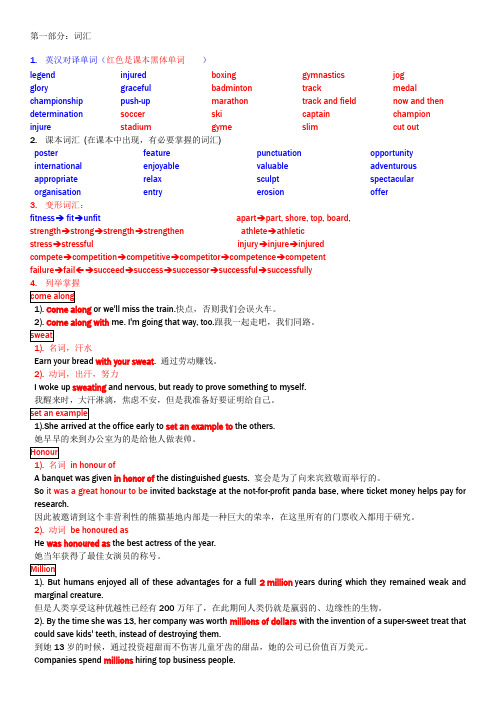
第一部分:词汇1.英汉对译单词(红色是课本黑体单词)legendglory championship determination injure injuredgracefulpush-upsoccerstadiumboxingbadmintonmarathonskigymegymnasticstracktrack and fieldcaptainslimjogmedalnow and thenchampioncut out2.课本词汇(在课本中出现,有必要掌握的词汇)poster international appropriate organisation featureenjoyablerelaxentrypunctuationvaluablesculpterosionopportunityadventurousspectacularoffer3.变形词汇:fitness→ fit→unfit apart→part, shore, top, board,strength→strong→strength→strengthen athlete→athleticstress→stressful injury→injure→injuredcompete→competition→competitive→competitor→competence→competentfailure→fail←→succeed→success→successor→successful→successfully4.列举掌握come along1). Come along or we'll miss the train.快点,否则我们会误火车。
2). Come along with me. I'm going that way, too.跟我一起走吧,我们同路。
sweatEarn your bread with your sweat. 通过劳动赚钱。
高一英语第3单元知识点
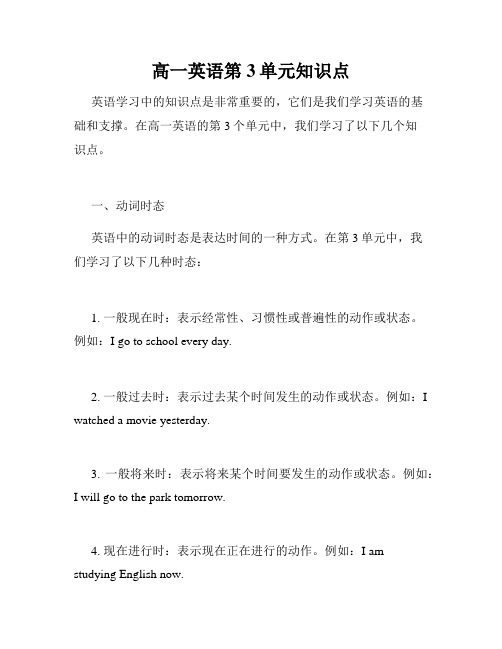
高一英语第3单元知识点英语学习中的知识点是非常重要的,它们是我们学习英语的基础和支撑。
在高一英语的第3个单元中,我们学习了以下几个知识点。
一、动词时态英语中的动词时态是表达时间的一种方式。
在第3单元中,我们学习了以下几种时态:1. 一般现在时:表示经常性、习惯性或普遍性的动作或状态。
例如:I go to school every day.2. 一般过去时:表示过去某个时间发生的动作或状态。
例如:I watched a movie yesterday.3. 一般将来时:表示将来某个时间要发生的动作或状态。
例如:I will go to the park tomorrow.4. 现在进行时:表示现在正在进行的动作。
例如:I am studying English now.5. 过去进行时:表示过去某个时间正在进行的动作。
例如:I was reading a book when she called.6. 现在完成时:表示过去某个时间发生的动作对现在造成的影响或结果。
例如:I have finished my homework.二、名词的单复数名词的单复数形式是英语中的重要内容之一。
在第3单元中,我们学习了以下几种名词的变化规则:1. 一般情况下,名词的复数形式是在词尾加上-s。
例如:book-books, pen-pens.2. 以s、x、sh、ch等音结尾的名词,其复数形式是在词尾加上-es。
例如:class-classes, box-boxes.3. 以辅音加y结尾的单词,将y变为i,再加-es。
例如:baby-babies, city-cities.4. 以f或fe结尾的名词,其复数形式一般将f或fe变为v,再加上-es。
例如:knife-knives, leaf-leaves.5. 有些名词的复数形式不规则,需要特殊记忆。
例如:man-men, woman-women.三、连词连词是连接词与词、词与短语、句子与句子之间的词语。
人教高一英语上册第3单元知识点归纳总结
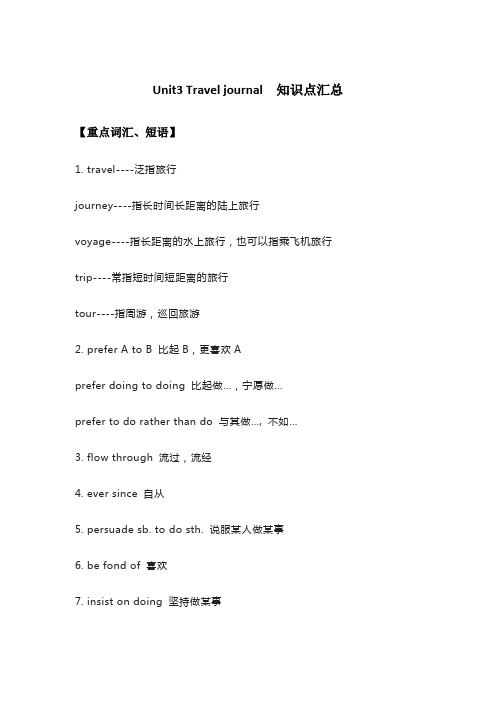
Unit3 Travel journal 知识点汇总【重点词汇、短语】1. travel----泛指旅行journey----指长时间长距离的陆上旅行voyage----指长距离的水上旅行,也可以指乘飞机旅行trip----常指短时间短距离的旅行tour----指周游,巡回旅游2. prefer A to B 比起B,更喜欢Aprefer doing to doing 比起做…,宁愿做…prefer to do rather than do 与其做…, 不如…3. flow through 流过,流经4. ever since 自从5. persuade sb. to do sth. 说服某人做某事6. be fond of 喜欢7. insist on doing 坚持做某事insist + that 从句(用should+ V原)8. care about 关心9. change one’s mind 改变想法10. altitude 高度attitude 态度,看法11. make up one’s mind to do下定决心做某事= decide to do = make a decision to do12. give in 让步,屈服give up 放弃13. be surprised to…对…感到惊奇to one’s surprise 令某人惊讶的是…14. at last = finally = in the end 最终15. stop to do 停下来去做某事stop doing 停止做某事16. as usual 像往常一样17. so…that 如此…以至于…so + adj + a/an + n. + thatsuch + a/an +adj. + n. + that18. be familiar with 对…熟悉(人作主语)be familiar to 为…所熟悉(物作主语)【重点句型】1. My sister and I have dreamed about cycling along the Mekong River from where it begins to where it ends. 我姐姐和我一直梦想要沿湄公河从源头到终点骑车旅行。
高一英语上 (Unit3. A taste of travel 基础知识梳理 )
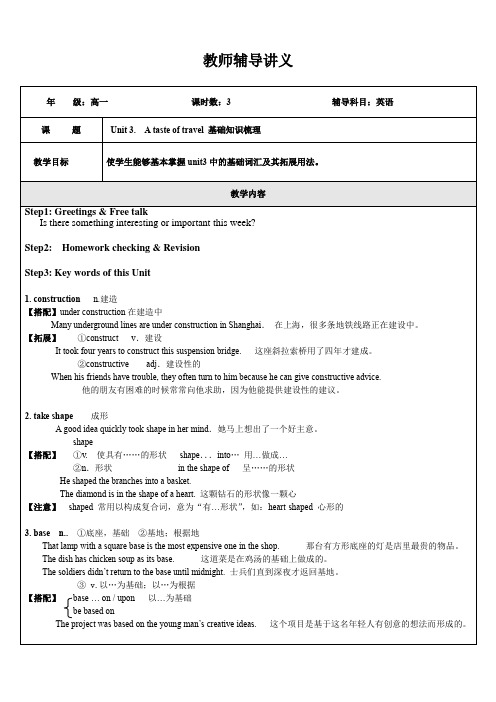
教师辅导讲义A. can …can'tB. may . . . may notC. must ... mustD. could ... couldn't5. When _______the forest fire which lasted three weeks out?A. did; putB. has; putC. has; been putD. was; put6. Our school, which _______in 1898, is one of the oldest schools in Shanghai.A. foundB. was foundC. was foundedD. founded7. The news that volunteer workers will go to homes for the aged ________now.A. is being talked aboutB. are being talked aboutC. is being talkedD. are being talked8. —Shall I go and get Dr Brown?—No, he_______.A. has been sent forB. had been sent forC would be sent for D. is sent for9. The last time when we passed by, many old houses_______.A. has been pulled downB. are being pulled downC. were being pulled downD. would be pulled down10. The Great Wall snakes over the mountain chains, and is regarded as one of the most beautiful tourist _______in the world.A. interestsB. attractionsC. placesD. directions11. Traditional values and cultures have been _____ well in some parts of our country.A. preservedB. savedC. involvedD. preventedI2. A man's dreams can only be a _____ of his sub consciousness .A. shapeB. reflectionC. sceneryD. view13.The cost of the material is _______in the bill for the work.A. heldB. includedC. keptD. packed14. He suddenly _______off the bicycle and luckily he was not injured.A. fellB. fallenC. falledD.felled15. If you climb up the peak of the mountain, you can enjoy a superb _____ of the city.A. sightB. viewC. sceneD. landscape16. The flowers in the garden look_______and smell _______A. wonderful; sweetB. nice; badlyC. beautiful; betterD. good; well17. Professor White has written some stories, but he is_____ known for his plays.A. the bestB. moreC. betterD. the most18.—How often do you go to the library?---- _____________A. In two daysB. Every few daysC. Each third dayD. After a few days19. It was difficult for me to____ the final conclusion at once.A. comeB. drawC. reachD. arrive20. His eyes shone brightly when he finally received the magazine he_______.A. had long been expectedB. had long expectedC. has long expectedD. was long expected***************************************************************************************************** Keys: 1. DBDA D 6—10 CAACB 11—15 ABBAB 16—20 ACBBBSection B:Fill in the blanks with suitable words or phrases from the list given below. Change the form where necessary.2. The investor has decided to abandon the project.3. It is said that he has been admitted to a university without taking the national entrance examinations.4. The tourists were attracted by the scenery of Li River.5. The construction of the Potala Palace is a wonder.6. Students must have access to good books.7. Standing on the top of the hill, we can overlook the whole village.8. In very hot summer, the most effective way to preserve food is to leave food in the refrigerator.Step5: 每课一练AOf all systems of symbols, language is the most highly developed. It has been pointed out that human beings, by agreement, can make anything stand for anything. Human beings have agreed, in the course of centuries of mutual(相互的) dependency, to let the various noises that they can produce with their lungs, throats, tongues, teeth, and lips systematically stand for certain happenings in their nervous system. We call that system of agreements language.There is no necessary connection between the symbol and that which it stands for. Just as social positions can be symbolized by feathers worn on the head, by gold on the watch chain, or by a thousand other things according to the culture we live in, so the fact of being hungry can be symbolized by a thousand different noises according to the culture we live in. However obvious these facts may appear at first glance, they are actually not so obvious as they seem except when we take special pains to think about the subject. Symbols and the things they stand for are independent of each other, yet we all have a way of feeling as if, and sometimes acting as if, there were necessary connections. For example, there are people who feel that foreign languages are unreasonable by nature-, foreigners have such funny names for things, and why can't they call things by their right names? This feeling exhibits itself most strongly in those English and American tourists who seem to believe that they can make the natives of any country understand English if they shout loud enough. Like the little boy who isreported to have said: " Pigs are called pigs because they are such dirty animals," they feel thatthe symbol is inherently (内在的) connected in some way with the things symbolized.()19. Language is a highly developed system of symbols because human beings_______________ .A.have made use of language for centuriese our nervous system to support languageC.have made various noises stand for any eventsD.can make anything stand for anything by agreement.( )20. What can we conclude from Paragraph 2?A.Different noises may mean different things.B.Our culture determines what a symbol stands for.C.The language we use symbolizes our social positions.D.Our social positions determine the way we are dressed.()21. In Paragraph 3, the underlined words "take special pains" probably means .A. try very hardB. take our timeC.are very unhappyD. feel especially painful()22. The example of the little boy is used to show that_________________ .A.adults often learn from their youngB."pig" is a dirty word because pigs are dirtyC.words are not connected with the things they stand forD.people sometimes have wrong idea about how language worksBThe greatest recent changes have been in the lives of women. During the twentieth century there was an unusual shortening of the time of a woman's life spent in caring for children. A woman marrying at the end of the 19th century would probably have been in her middle twenties, and would be likely to have seven or eight children, of whom four or five lived till they were five years old. By the time the youngest was fifteen, the mother would have been in her early fifties and would expect to live a further twenty years, during which custom, chance and health made it unusual for her to get paid work. Today women marry younger and have fewer children. Usually a woman's youngest child will be fifteen when she is forty-five and is likely to take paid work until retirement at sixty. Even while she has the care of children, her work is lightened by household appliances(家用电器) and convenience foods.This important change in women's way of life has only recently begun to have its full effect on women's economic position. Even a few years ago most girls left school at the first opportunity and most of them took a full-time job. However, when they married, they usually left work at once and never returned to it. Today the school-leaving age is sixteen, many girls stay at school after that age, and though women tend to marry younger, more married women stay at work at least until shortly before their first child is born. Many more after wads, return to full or part-time work. Such changes have led to a new relationship in marriage, with both husband and wife accepting a greater share of the duties and satisfaction of family life, and with both husband and wife sharing more equally in providing the money and running the home, according to the abilities and interest of each of them.()23. We are told that in an average family about 1990 .A.many children died before they were fiveB.the youngest child would be fifteenC.seven of eight children lived to be more than fiveD.four or five children died when they were five()24. When she was over fifty, the late 19th century mother___________________ .A.would expect to work until she diedB.was usually expected to take up paid employmentC.would be healthy enough to take up paid employmentD.was unlikely to find a job even if she is now likely()25. Many girls, the passage says, are now likely to ___________________ .A.marry so that they can get a jobB.leave school as soon as they canC.give up their jobs for good after they are marriedD.continue working until they are going to have a baby( )26. According to the passage, it is now quite usual for women to____________________ .A.stay at home after leaving schoolB.marry men younger than themselvesC.start working again later in life。
人教版本高中高一英语上册的Unit3学习知识点总结计划.doc

人教版高一英语上册 Unit3知识点总结一、知点1.preferprefer doing to talking 喜做而不喜Which of these two dresses do you prefer? 两套衣服你喜哪一套 ?I prerer to go to America for my fruther study. 我更愿意去美国修学。
Anne prefers me to replace her at the meeting. 安妮更愿意我代替她去参加会。
2. advantages and disadvantages 劣3. How do they make use of it in their daily life? 在日常生活中他是如何利用它的4.flow through 流,流5.Ever since middle school, my sister Wang Wei and I havedreamed about taking a great bike trip. 从高中起,我姐姐王和我就一直梦想做一次大的自行旅行。
since 引的状从句用一般去,介since 与表示去某一点的用,副since 后不用从句或。
It is/has been+ 一段 +since+ 一般去 ( 从句中的作不能延 )自从⋯⋯至今已多久了。
since then 自从那至今 ever since 从那以后一直6.persuade sb to do sth= persuade sb into doing sth服某人做某事He persuaded her to go to school, even though she did notwant to. 即使她不想去上学,他是服她去。
7.After graduating fro college, we finally got the chance totake a bike trip.大学以后,我于有了机会自行旅行。
高一英语unit3知识点

高一英语unit3知识点高一英语Unit 3 知识点英语学习在高一阶段对于学生来说非常关键,而Unit 3更是其中一个重要的单元。
在这个单元中,学生将学习到一些关于健康和生活方式的话题,以及相关的词汇、语法和表达方式。
本文将以以下几个方面来论述Unit 3的知识点:一、词汇与短语Unit 3中的词汇与短语包括了很多与健康和生活方式相关的概念。
例如,学生会学习到一些表示食物的词汇,如fruit(水果)、vegetable(蔬菜)、meat(肉类)等。
同时,还会学习到一些与运动和锻炼相关的词汇和短语,如exercise(锻炼)、keep fit(保持健康)等。
掌握这些词汇和短语有助于学生更好地进行英语交流,并能够表达自己的观点和建议。
二、语法在Unit 3中,学生将会学习到一些与情态动词相关的语法知识。
情态动词包括can、may、should等,它们在句子中多用来表示能力、许可和建议等。
学生需要了解这些情态动词的用法,并能够灵活运用它们来表达自己的意思。
例如,当谈论健康问题时,可以用should来给出建议,如"You should eat more vegetables and exercise regularly."三、阅读与听力在Unit 3的学习中,学生还需要进行一些阅读和听力练习。
阅读和听力可以帮助学生提高听力和阅读理解的能力,同时也能够帮助他们更好地理解课文中的内容。
例如,学生可以通过阅读文章了解一些关于健康饮食和运动的知识,并能够回答相关的问题。
而通过听力练习,学生可以提高自己的听力水平,并培养对不同口音和语速的适应能力。
四、口语与写作在Unit 3的学习中,学生需要进行一些口语和写作练习。
口语练习可以帮助学生提高口语表达能力,并能够更好地应对与健康和生活方式相关的话题。
例如,学生可以与同学们进行讨论,谈论自己的健康习惯和生活方式,并互相提供建议。
此外,写作练习也是学生提高英语写作能力的重要途径。
高一上英语三单元知识点
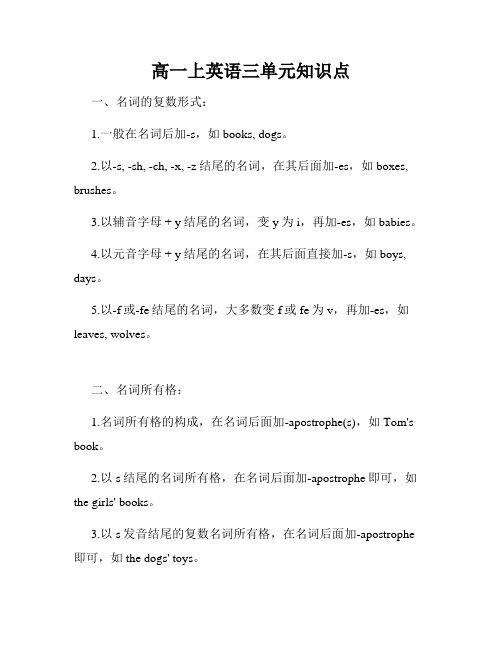
高一上英语三单元知识点一、名词的复数形式:1.一般在名词后加-s,如books, dogs。
2.以-s, -sh, -ch, -x, -z结尾的名词,在其后面加-es,如boxes, brushes。
3.以辅音字母 + y结尾的名词,变y为i,再加-es,如babies。
4.以元音字母 + y结尾的名词,在其后面直接加-s,如boys, days。
5.以-f或-fe结尾的名词,大多数变f或fe为v,再加-es,如leaves, wolves。
二、名词所有格:1.名词所有格的构成,在名词后面加-apostrophe(s),如Tom's book。
2.以s结尾的名词所有格,在名词后面加-apostrophe即可,如the girls' books。
3.以s发音结尾的复数名词所有格,在名词后面加-apostrophe 即可,如the dogs' toys。
三、形容词的比较级和最高级:1.单音节形容词和部分双音节形容词,比较级在词尾加-er,最高级在词尾加-est,如long, longer, longest。
2.以字母e结尾的形容词,比较级在词尾加-r,最高级在词尾加-st,如nice, nicer, nicest。
3.部分双音节和多音节形容词,在前面加more (比较级)或most (最高级),如expensive, more expensive, most expensive。
四、动词的时态和语态:1.一般现在时:主语 + 动词原形。
如I study English every day.2.一般过去时:主语 + 动词过去式。
如She danced at the party last night.3.一般将来时:主语 + will + 动词原形。
如They will visit their grandparents next week.4.现在进行时:主语 + am/is/are + 现在分词。
高一英语上册Unit3知识点
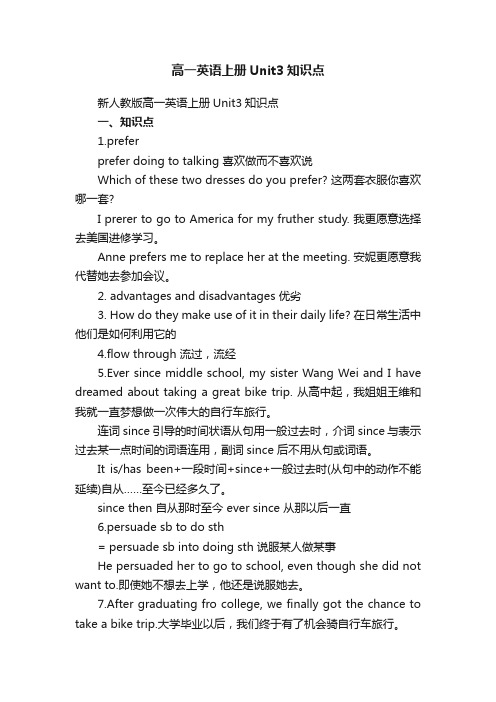
高一英语上册Unit3知识点新人教版高一英语上册Unit3知识点一、知识点1.preferprefer doing to talking 喜欢做而不喜欢说Which of these two dresses do you prefer? 这两套衣服你喜欢哪一套?I prerer to go to America for my fruther study. 我更愿意选择去美国进修学习。
Anne prefers me to replace her at the meeting. 安妮更愿意我代替她去参加会议。
2. advantages and disadvantages 优劣3. How do they make use of it in their daily life? 在日常生活中他们是如何利用它的4.flow through 流过,流经5.Ever since middle school, my sister Wang Wei and I have dreamed about taking a great bike trip. 从高中起,我姐姐王维和我就一直梦想做一次伟大的自行车旅行。
连词since 引导的时间状语从句用一般过去时,介词since 与表示过去某一点时间的词语连用,副词since 后不用从句或词语。
It is/has been+一段时间+since+一般过去时(从句中的动作不能延续)自从……至今已经多久了。
since then 自从那时至今 ever since 从那以后一直6.persuade sb to do sth= persuade sb into doing sth 说服某人做某事He persuaded her to go to school, even though she did not want to.即使她不想去上学,他还是说服她去。
7.After graduating fro college, we finally got the chance to take a bike trip.大学毕业以后,我们终于有了机会骑自行车旅行。
高一英语第三单元短语知识点
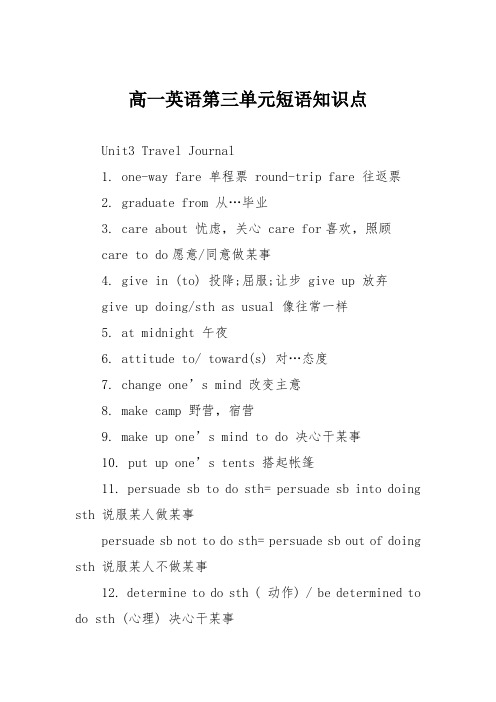
高一英语第三单元短语知识点
Unit3 Travel Journal
1. one-way fare 单程票 round-trip fare 往返票
2. graduate from 从…毕业
3. care about 忧虑,关心 care for喜欢,照顾
care to do愿意/同意做某事
4. give in (to) 投降;屈服;让步 give up 放弃
give up doing/sth as usual 像往常一样
5. at midnight 午夜
6. attitude to/ toward(s) 对…态度
7. change one’s mind 改变主意
8. make camp 野营,宿营
9. make up one’s mind to do 决心干某事
10. put up one’s tents 搭起帐篷
11. persuade sb to do sth= persuade sb into doing sth 说服某人做某事
persuade sb not to do sth= persuade sb out of doing sth 说服某人不做某事
12. determine to do sth ( 动作) / be determined to do sth (心理) 决心干某事
13. take one’s breath away 使某人大吃一惊
高一英语第三单元短语知识点全部内容就是这些,请关注!
高一英语上学期期中必背知识点归纳总结
2016学年高一英语上学期期中复习要点。
高一英语必修一u3知识点总结
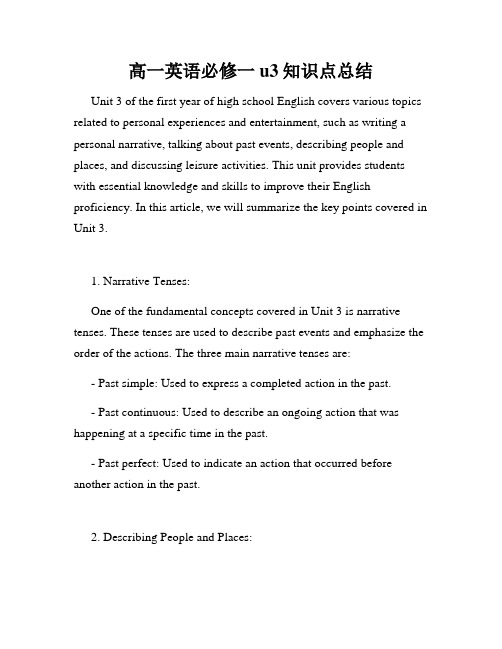
高一英语必修一u3知识点总结Unit 3 of the first year of high school English covers various topics related to personal experiences and entertainment, such as writing a personal narrative, talking about past events, describing people and places, and discussing leisure activities. This unit provides students with essential knowledge and skills to improve their English proficiency. In this article, we will summarize the key points covered in Unit 3.1. Narrative Tenses:One of the fundamental concepts covered in Unit 3 is narrative tenses. These tenses are used to describe past events and emphasize the order of the actions. The three main narrative tenses are:- Past simple: Used to express a completed action in the past.- Past continuous: Used to describe an ongoing action that was happening at a specific time in the past.- Past perfect: Used to indicate an action that occurred before another action in the past.2. Describing People and Places:Unit 3 also focuses on enhancing students' ability to describe people and places. This includes using appropriate adjectives and expressions to provide vivid and detailed descriptions. Furthermore, it is essential to understand the proper use of comparative and superlative forms when making comparisons.3. Expressions for Past Experiences:In this unit, students learn expressions that are commonly used when discussing past experiences. These expressions include "used to," which indicates a habitual action in the past; "would," which highlights past repeated actions; and "didn't use to," which signifies a change in past habits.4. Leisure Activities and Hobbies:Unit 3 provides an opportunity for students to discuss leisure activities and hobbies. They learn vocabulary related to sports, games, and hobbies, as well as how to express preferences and opinions about various activities. This enables students to communicate effectively when talking about their interests and pastimes.5. Vocabulary Building:Throughout the unit, students are introduced to a range of new vocabulary related to the topics being covered. It is important for students to actively engage with the new words and phrases, practicing their pronunciation and usage.6. Reading Comprehension Strategies:Unit 3 includes reading passages that aim to improve students' reading comprehension skills. They are encouraged to utilize various strategies, such as skimming, scanning, and inferencing, to better understand the content and extract key information from the texts.7. Writing Skills:The unit concludes with a focus on writing skills, particularly personal narratives. Students learn how to structure their narratives effectively, use appropriate vocabulary and grammar, and create engaging introductions and conclusions.In conclusion, Unit 3 of high school English provides students with essential knowledge and skills in personal experiences and entertainment. The key points covered in this unit include narrative tenses, describing people and places, expressions for past experiences, leisure activities and hobbies, vocabulary building, reading comprehension strategies, and writing skills. By understanding andapplying these key points, students can enhance their English proficiency and effectively communicate about these topics.。
高一英语第三单元的知识点
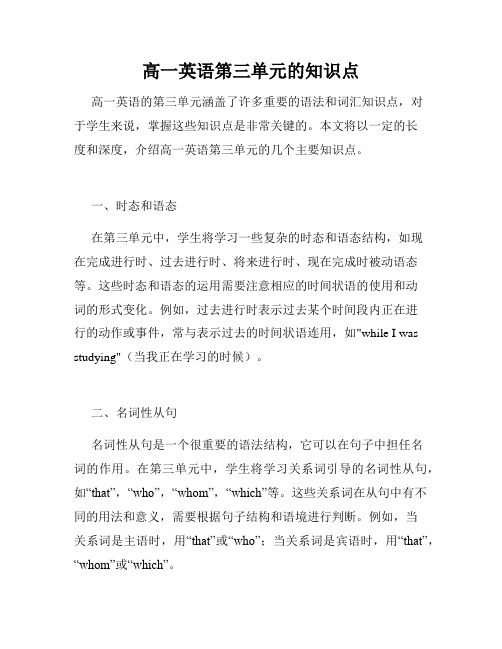
高一英语第三单元的知识点高一英语的第三单元涵盖了许多重要的语法和词汇知识点,对于学生来说,掌握这些知识点是非常关键的。
本文将以一定的长度和深度,介绍高一英语第三单元的几个主要知识点。
一、时态和语态在第三单元中,学生将学习一些复杂的时态和语态结构,如现在完成进行时、过去进行时、将来进行时、现在完成时被动语态等。
这些时态和语态的运用需要注意相应的时间状语的使用和动词的形式变化。
例如,过去进行时表示过去某个时间段内正在进行的动作或事件,常与表示过去的时间状语连用,如"while I was studying"(当我正在学习的时候)。
二、名词性从句名词性从句是一个很重要的语法结构,它可以在句子中担任名词的作用。
在第三单元中,学生将学习关系词引导的名词性从句,如“that”,“who”,“whom”,“which”等。
这些关系词在从句中有不同的用法和意义,需要根据句子结构和语境进行判断。
例如,当关系词是主语时,用“that”或“who”;当关系词是宾语时,用“that”,“whom”或“which”。
三、介词短语介词短语是由介词、名词或代词组成的短语,在句子中充当定语、状语或补语。
在第三单元中,学生将学习一些常见的介词短语,如“in front of”,“on top of”,“at the bottom of”等。
学生需要理解这些介词短语所表示的空间关系,并能正确运用它们来描述位置、方向或时间。
例如,可以说“the book is on the table”(书在桌子上)。
四、词汇与表达词汇在英语学习中起着十分重要的作用。
第三单元中,学生将学习一些重要的词汇和表达方式,如“exciting”,“boring”,“be interested in”,“get tired of”等。
学生需要通过阅读、听力、书面表达等各种方式来积累和运用这些词汇,以提升自己的词汇量和语言表达能力。
总之,高一英语第三单元的知识点包括时态和语态、名词性从句、介词短语以及词汇与表达等。
高一英语第三单元知识点总结
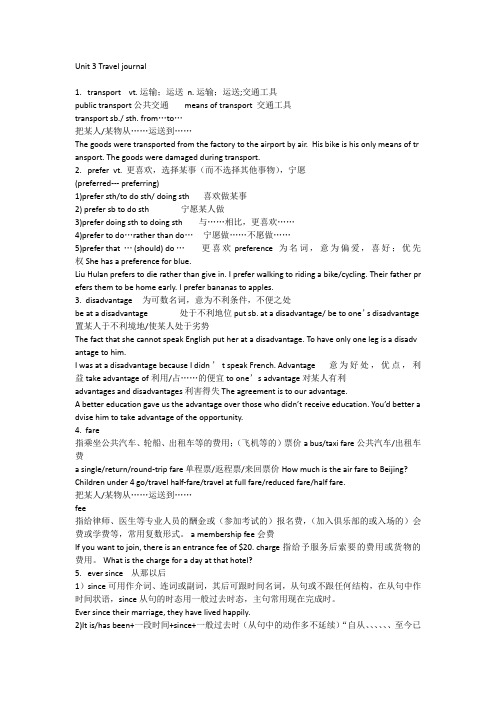
Unit 3 Travel journal1. transport vt. 运输;运送 n. 运输;运送;交通工具public transport 公共交通 means of transport 交通工具transport sb./ sth. from…to…把某人/某物从……运送到……The goods were transported from the factory to the airport by air. His bike is his only means of tr ansport. The goods were damaged during transport.2. prefer vt. 更喜欢,选择某事(而不选择其他事物),宁愿(preferred--- preferring)1)prefer sth/to do sth/ doing sth 喜欢做某事2) prefer sb to do sth 宁愿某人做3)prefer doing sth to doing sth 与……相比,更喜欢……4)prefer to do…rather than do…宁愿做……不愿做……5)prefer that …(should) do…更喜欢 preference为名词,意为偏爱,喜好;优先权 She has a preference for blue.Liu Hulan prefers to die rather than give in. I prefer walking to riding a bike/cycling. Their father pr efers them to be home early. I prefer bananas to apples.3. disadvantage 为可数名词,意为不利条件,不便之处be at a disadvantage 处于不利地位 put sb. at a disadvantage/ be to one’s disadvantage 置某人于不利境地/使某人处于劣势The fact that she cannot speak English put her at a disadvantage. To have only one leg is a disadv antage to him.I was at a disadvantage because I didn’t speak French. Advantage 意为好处,优点,利益 take advantage of利用/占……的便宜 to one’s advantage 对某人有利advantages and disadvantages 利害得失 The agreement is to our advantage.A better education gave us the advantage over those who didn’t receive education. You’d better a dvise him to take advantage of the opportunity.4. fare指乘坐公共汽车、轮船、出租车等的费用;(飞机等的)票价 a bus/taxi fare 公共汽车/出租车费a single/return/round-trip fare 单程票/返程票/来回票价 How much is the air fare to Beijing? Children under 4 go/travel half-fare/travel at full fare/reduced fare/half fare.把某人/某物从……运送到……fee指给律师、医生等专业人员的酬金或(参加考试的)报名费,(加入俱乐部的或入场的)会费或学费等,常用复数形式。
高中必修一英语第三单元知识总结
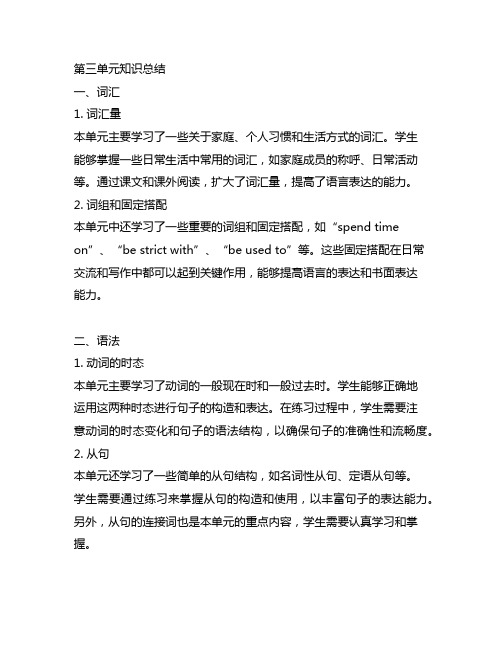
第三单元知识总结一、词汇1. 词汇量本单元主要学习了一些关于家庭、个人习惯和生活方式的词汇。
学生能够掌握一些日常生活中常用的词汇,如家庭成员的称呼、日常活动等。
通过课文和课外阅读,扩大了词汇量,提高了语言表达的能力。
2. 词组和固定搭配本单元中还学习了一些重要的词组和固定搭配,如“spend time on”、“be strict with”、“be used to”等。
这些固定搭配在日常交流和写作中都可以起到关键作用,能够提高语言的表达和书面表达能力。
二、语法1. 动词的时态本单元主要学习了动词的一般现在时和一般过去时。
学生能够正确地运用这两种时态进行句子的构造和表达。
在练习过程中,学生需要注意动词的时态变化和句子的语法结构,以确保句子的准确性和流畅度。
2. 从句本单元还学习了一些简单的从句结构,如名词性从句、定语从句等。
学生需要通过练习来掌握从句的构造和使用,以丰富句子的表达能力。
另外,从句的连接词也是本单元的重点内容,学生需要认真学习和掌握。
三、阅读理解1. 阅读材料本单元的阅读材料主要围绕家庭、个人习惯和生活方式展开,叙述了不同家庭的生活情况和个人的生活习惯。
这些材料能够让学生更好地了解不同文化背景下的生活方式和家庭情况,培养学生的跨文化交际能力。
2. 阅读技巧通过本单元的阅读材料,学生能够提高阅读理解能力,培养对文章内容的理解和分析能力。
学生还能够通过阅读材料来提高词汇量和语法知识,为写作和口语表达打下基础。
四、口语表达1. 基本句型在本单元中,学生学习了一些关于家庭和个人生活方式的基本句型,如“Do you have any brothers or sisters?”、“What’s your d 本人ly routine like?”等。
通过练习,学生能够熟练地运用这些句型进行口语表达,丰富了日常交流的内容。
2. 口语技巧本单元还着重培养学生的口语表达能力,帮助他们提高在日常生活中的口语表达水平。
新高一英语第3单元知识点

新高一英语第3单元知识点第一部分:单词和短语1. theme n. 主题;主旨The theme of the book is about love and friendship.2. plot n. 情节;剧情The plot of the movie was filled with suspense and surprises.3. character n. 角色;人物The main character in the story is a brave and adventurous young girl.4. conflict n. 冲突;矛盾The conflict between the two characters intensified as the story progressed.5. setting n. 背景;环境The story is set in a small coastal town during the 19th century.6. climax n. 高潮;顶点The climax of the film had the audience on the edge of their seats.7. resolution n. 解决;解决办法The resolution of the conflict brought a sense of closure to the story.8. dialogue n. 对话;对白The dialogue between the two characters revealed their true feelings.9. metaphor n. 隐喻;比喻The writer used a metaphor to describe the city as a living organism.10. symbol n. 象征;符号The dove is often used as a symbol of peace and harmony.第二部分:语法和句型1. Conditional sentences:- If it rains tomorrow, we won't go to the beach.- Unless you study hard, you won't pass the exam.2. Passive voice:- The book was written by a famous author.- The film was directed by an award-winning filmmaker.3. Reported speech:- He said he was going to the store.- She asked if I had seen the new movie.4. Comparative and superlative forms:- This book is more interesting than the one I read last week. - She is the tallest girl in our class.5. Indirect questions:- Can you tell me where the nearest post office is?- Do you know how much the concert tickets cost?第三部分:阅读理解和写作技巧1. Skimming and scanning:Skimming refers to quickly looking through a text to get a general idea of its content, while scanning involves searching for specific information within a text.2. Inference:Making inferences involves drawing conclusions based on the information given in a text, as well as using background knowledge and logical reasoning.3. Note-taking:Taking notes while reading can help in understanding and retaining important information. It is also useful when preparing for exams or writing essays.4. Paraphrasing:Paraphrasing involves restating information in your own words, while retaining the original meaning. This is a useful skill for summarizing texts or avoiding plagiarism.5. Writing a summary:Summarizing involves condensing the main points of a text into a shorter version, while maintaining the overall meaning and key details.第四部分:阅读推荐1. "To Kill a Mockingbird" by Harper Lee2. "Pride and Prejudice" by Jane Austen3. "1984" by George Orwell4. "The Great Gatsby" by F. Scott Fitzgerald5. "The Catcher in the Rye" by J.D. Salinger以上是新高一英语第3单元的一些重要的知识点和技巧。
高一上英语unit3知识点总结
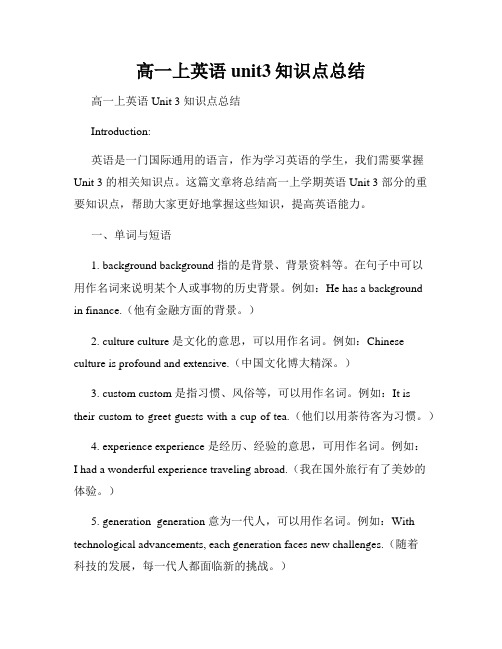
高一上英语unit3知识点总结高一上英语Unit 3 知识点总结Introduction:英语是一门国际通用的语言,作为学习英语的学生,我们需要掌握Unit 3 的相关知识点。
这篇文章将总结高一上学期英语 Unit 3 部分的重要知识点,帮助大家更好地掌握这些知识,提高英语能力。
一、单词与短语1. background background 指的是背景、背景资料等。
在句子中可以用作名词来说明某个人或事物的历史背景。
例如:He has a backgroundin finance.(他有金融方面的背景。
)2. culture culture 是文化的意思,可以用作名词。
例如:Chinese culture is profound and extensive.(中国文化博大精深。
)3. custom custom 是指习惯、风俗等,可以用作名词。
例如:It is their custom to greet guests with a cup of tea.(他们以用茶待客为习惯。
)4. experience experience 是经历、经验的意思,可用作名词。
例如:I had a wonderful experience traveling abroad.(我在国外旅行有了美妙的体验。
)5. generation generation 意为一代人,可以用作名词。
例如:With technological advancements, each generation faces new challenges.(随着科技的发展,每一代人都面临新的挑战。
)二、语法1. 物主代词与名词性物主代词a) 形容词性物主代词通常修饰名词,如 my, your, his, her, its, our, their 等。
例如:My book is on the table.(我的书在桌子上。
)b) 名词性物主代词通常作主语或宾语,如 mine, yours, his, hers, its, ours, theirs 等。
英语第三单元小结
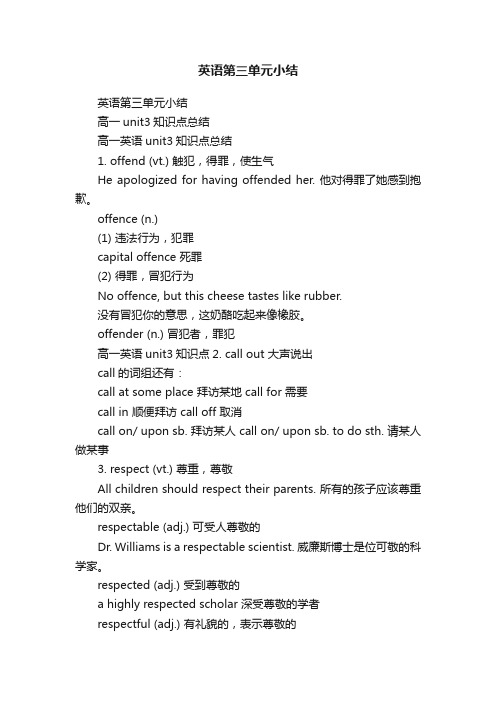
英语第三单元小结英语第三单元小结高一unit3知识点总结高一英语unit3知识点总结1. offend (vt.) 触犯,得罪,使生气He apologized for having offended her. 他对得罪了她感到抱歉。
offence (n.)(1) 违法行为,犯罪capital offence 死罪(2) 得罪,冒犯行为No offence, but this cheese tastes like rubber.没有冒犯你的意思,这奶酪吃起来像橡胶。
offender (n.) 冒犯者,罪犯高一英语unit3知识点2. call out 大声说出call的词组还有:call at some place 拜访某地 call for 需要call in 顺便拜访 call off 取消call on/ upon sb. 拜访某人 call on/ upon sb. to do sth. 请某人做某事3. respect (vt.) 尊重,尊敬All children should respect their parents. 所有的孩子应该尊重他们的双亲。
respectable (adj.) 可受人尊敬的Dr. Williams is a respectable scientist. 威廉斯博士是位可敬的科学家。
respected (adj.) 受到尊敬的a highly respected scholar 深受尊敬的学者respectful (adj.) 有礼貌的,表示尊敬的He is always respectful to his teacher. 他总是很尊重他的老师。
respective (adj.) 各自的The three men were given work according to their respective abilities.这三个人按其各自的能力被分配了工作。
